Key takeaways:
- Open-source contributions foster collaboration, personal growth, and a sense of belonging among developers.
- Engagement in open-source enhances technical skills and real-world application understanding, benefiting both individuals and communities.
- Contributing can be daunting but starting with manageable tasks and embracing community support creates opportunities for learning and development.
- Constructive criticism is vital for improving skills and fostering relationships within the open-source community.
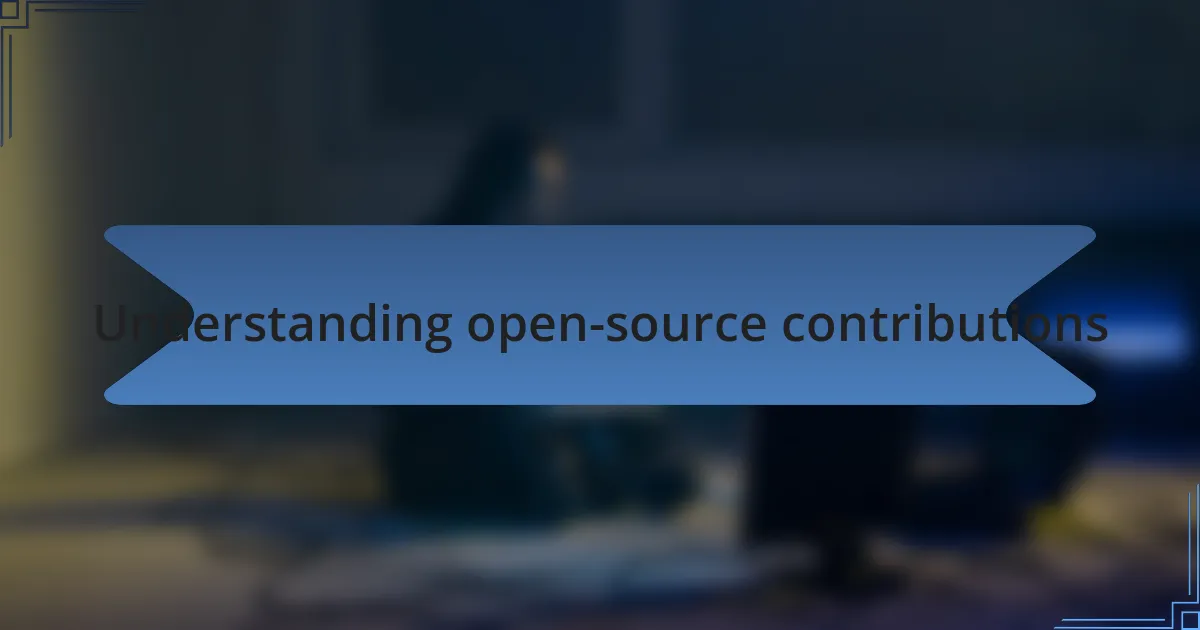
Understanding open-source contributions
Open-source contributions represent a collaborative effort where developers from all over the globe come together to create and improve software. I remember the first time I made a small contribution to a project — it felt like joining a vibrant community where everyone was eager to share knowledge. Have you ever felt that exhilarating rush of teamwork, where each line of code brings you closer to a collective goal? It’s not just about coding; it’s about connecting with like-minded individuals who share a passion for innovation.
When I first navigated GitHub, I was overwhelmed by the sheer size and variety of projects available for contribution. It struck me how accessible open-source really is; anyone can jump in and offer value, be it through code, documentation, or even bug reporting. It reminded me of my early days in programming — how I was both excited and terrified to share my work. This duality is common in the open-source world; the fear of judgment often contends with a desire to contribute and learn.
Furthermore, I realized that open-source contributions extend beyond mere technical skills; they also foster personal growth and a sense of belonging. Each pull request I submitted felt like a personal challenge, pushing me to improve my coding abilities while receiving feedback and support from others. Have you ever considered how your contributions could transform not just the software but also your own personal development? It’s a powerful journey that marries technical expertise with human connection.
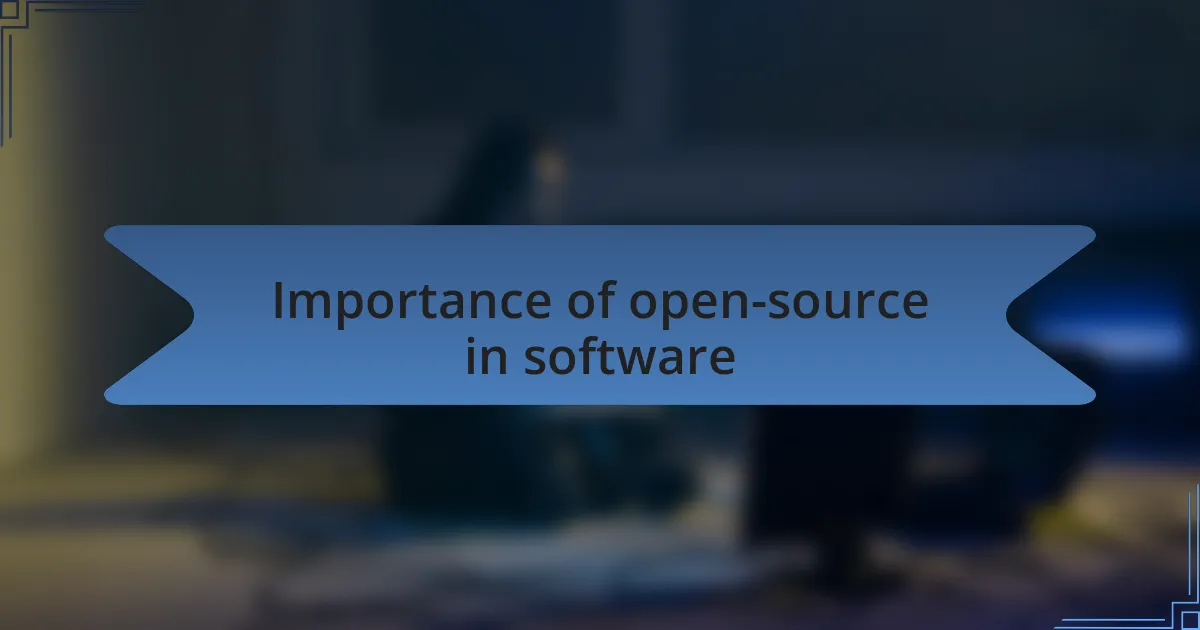
Importance of open-source in software
Open-source software plays a pivotal role in driving innovation within the tech community. I remember working on a small feature for a popular open-source project and witnessing firsthand how quickly improvements can flow from diverse perspectives. Have you ever experienced the thrill of seeing your ideas come to life, fueled by collaborative feedback? It’s a reminder that when we share our work openly, we invite a cycle of continuous enhancement that proprietary software simply cannot match.
The accessibility of open-source projects also fosters inclusivity, allowing developers from various backgrounds to contribute, regardless of their experience level. I once mentored a newcomer who felt intimidated by complex codebases but soon found their footing by tackling documentation tasks. This experience taught me that every contribution, big or small, is valuable and essential for creating a richer, more comprehensive resource for everyone. Wouldn’t you agree that this collective effort not only empowers individuals but also builds stronger, more resilient communities?
Moreover, engaging with open-source initiatives expands not just our technical skills but also our understanding of real-world applications. My involvement in a project that transformed citizen data into usable software opened my eyes to the impact code can have on society. How often do we stop to think about the broader implications of the software we help shape? This deeper appreciation for our contributions underlines the importance of open-source; it’s not merely about the code we write but the change we can foster together.
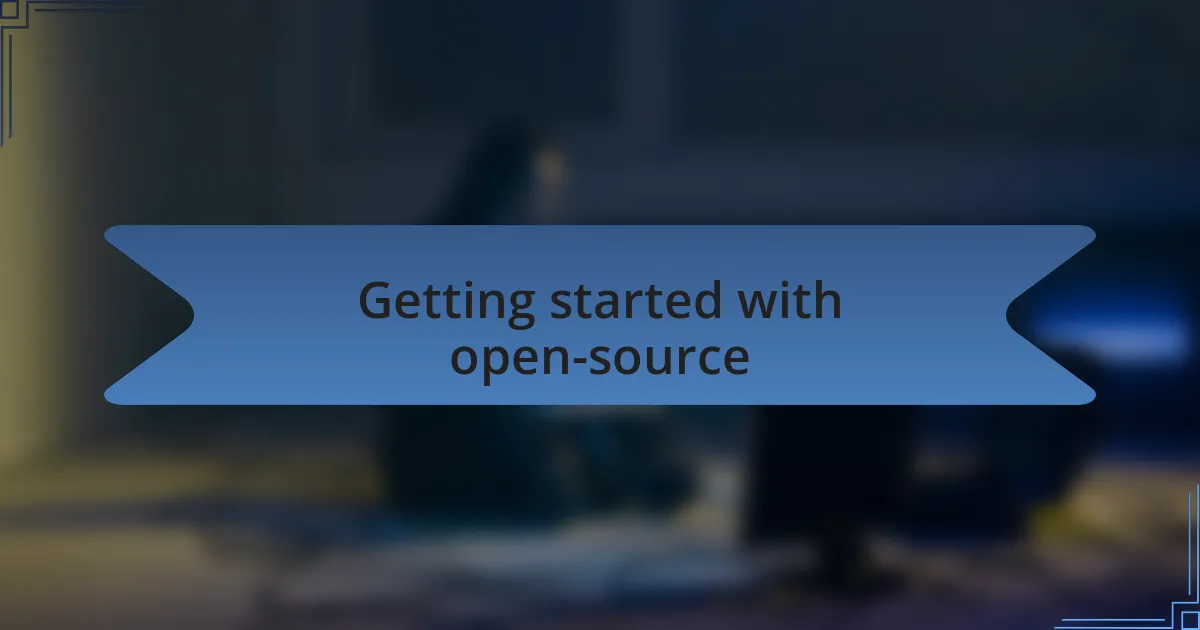
Getting started with open-source
Getting started with open-source might seem daunting, but it’s easier than you think. I remember the day I decided to dive in—I was overwhelmed by options, but a simple search for beginner-friendly projects pointed me in the right direction. Have you ever stumbled upon a project that sparked your interest? It’s that initial spark that can ignite your journey.
Once you find a project, familiarize yourself with its structure and community guidelines. I vividly recall spending my first evening analyzing README files and issues on GitHub; I felt like an investigator piecing together a puzzle. Each step I took, whether commenting on a thread or submitting a small bug fix, connected me more to the community. Have you considered how each interaction can deepen your understanding and enhance your skills?
Engagement is key when it comes to contributing. I learned that starting with documentation or minor code fixes not only builds confidence but also establishes rapport with other contributors. Have you thought about how sharing your learning process can inspire others? It’s incredibly rewarding to see how even the smallest contributions can have a ripple effect, encouraging others to join in and make their mark.
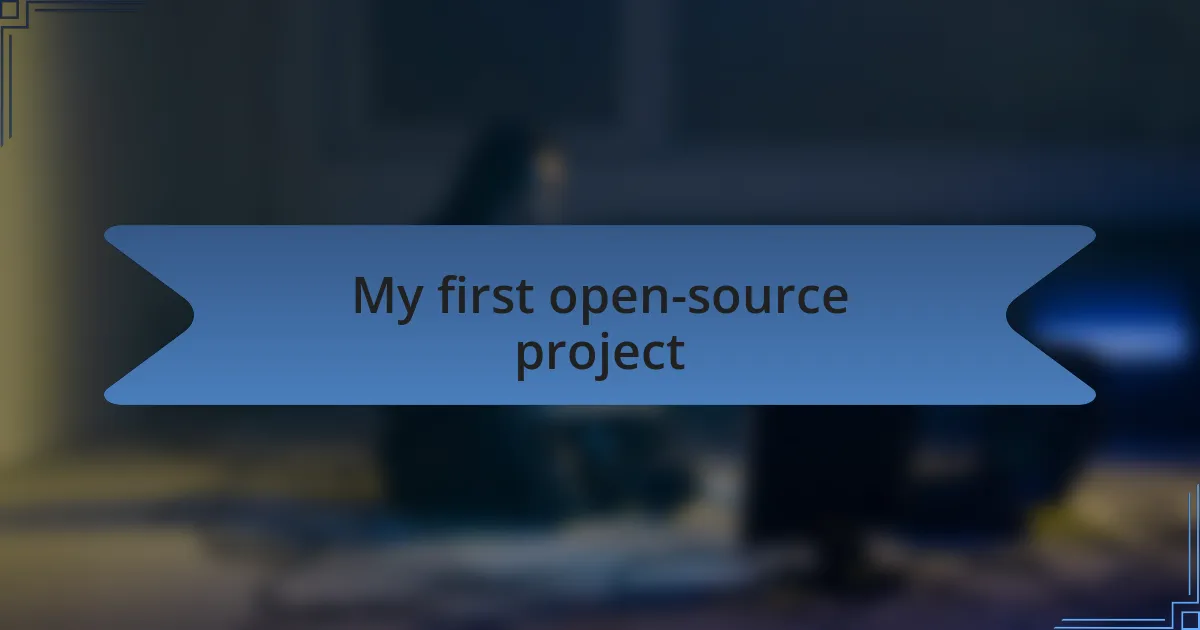
My first open-source project
I remember my first open-source project as if it were yesterday. I stumbled upon a small library for data visualization that had a welcoming community. As I joined the project, I felt a mix of excitement and anxiety—would my contributions really matter? Diving into the code, I was surprised to see how even minor improvements made a significant impact. Have you ever felt that surge of adrenaline when tackling something new?
What struck me most was the sense of belonging that came from working alongside others who shared a passion for coding. I reached out with questions about the project, and the responses from more experienced contributors were encouraging. Their generosity with advice fueled my motivation, creating a vibrant atmosphere where everyone strived to help one another succeed. Have you ever experienced the warmth of collaboration that transforms a daunting task into a collective effort?
As I submitted my first pull request, my heart raced. I had meticulously combed through the code, anxious that I overlooked something critical. The moment it was accepted, I felt an overwhelming sense of accomplishment. I realized that contributing to this project wasn’t just about fixing bugs— it was about being part of a larger mission that could help countless users improve their experience. Isn’t it fascinating how the act of contributing can foster both personal growth and community development simultaneously?
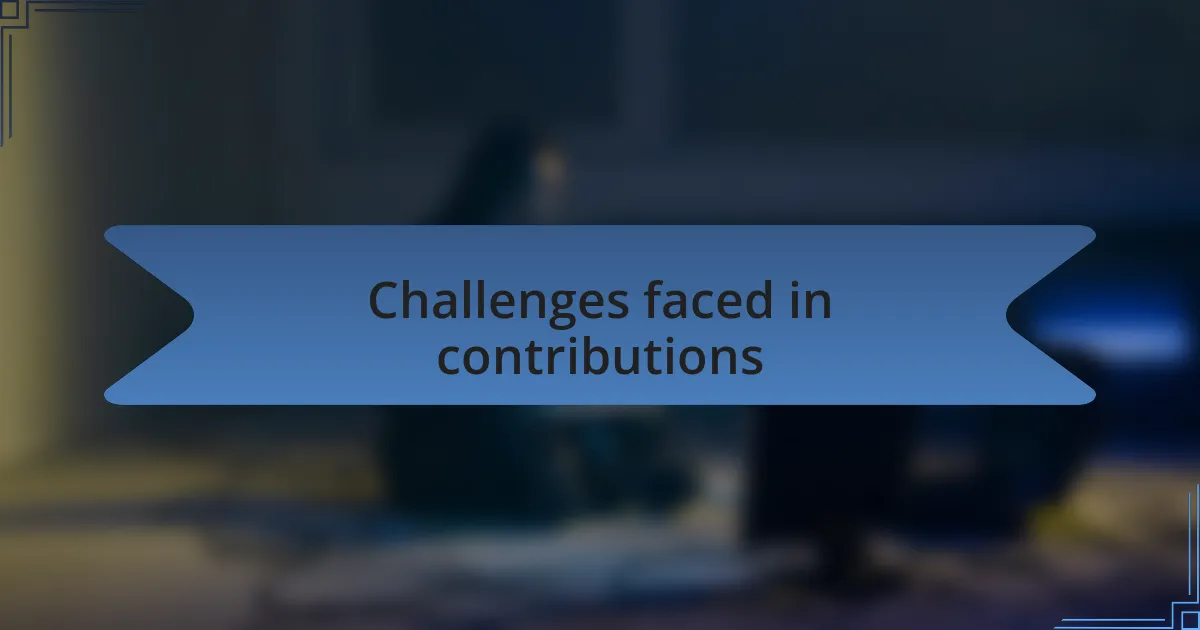
Challenges faced in contributions
Contributing to open-source projects is an incredible experience, but it doesn’t come without its hurdles. Initially, I was met with the challenge of understanding the project’s codebase, which often felt like trying to solve a complex puzzle without all the pieces. Have you ever looked at an unfamiliar code, overwhelmed by the sheer number of files and dependencies? It took time for me to navigate through the intricacies, but persistence paid off.
Another challenge I encountered was the potential for criticism in code reviews. The first time someone pointed out flaws in my work, I felt a wave of self-doubt. Was I really cut out for this? However, I’ve since learned that constructive criticism is a gift, meant to hone my skills and enhance the project. How often do we overlook the opportunity to grow simply because we fear negative feedback?
Balancing my open-source contributions with other responsibilities was also an ongoing struggle. There were weeks when I felt like I was racing against the clock, trying to squeeze in coding sessions amidst a busy schedule. But I discovered that the community often rallied around each other, offering flexible timelines and understanding. Have you found support in unexpected places during your own journeys? In those moments, I realized that collaboration is not just about coding; it’s about mutual support and shared struggles.
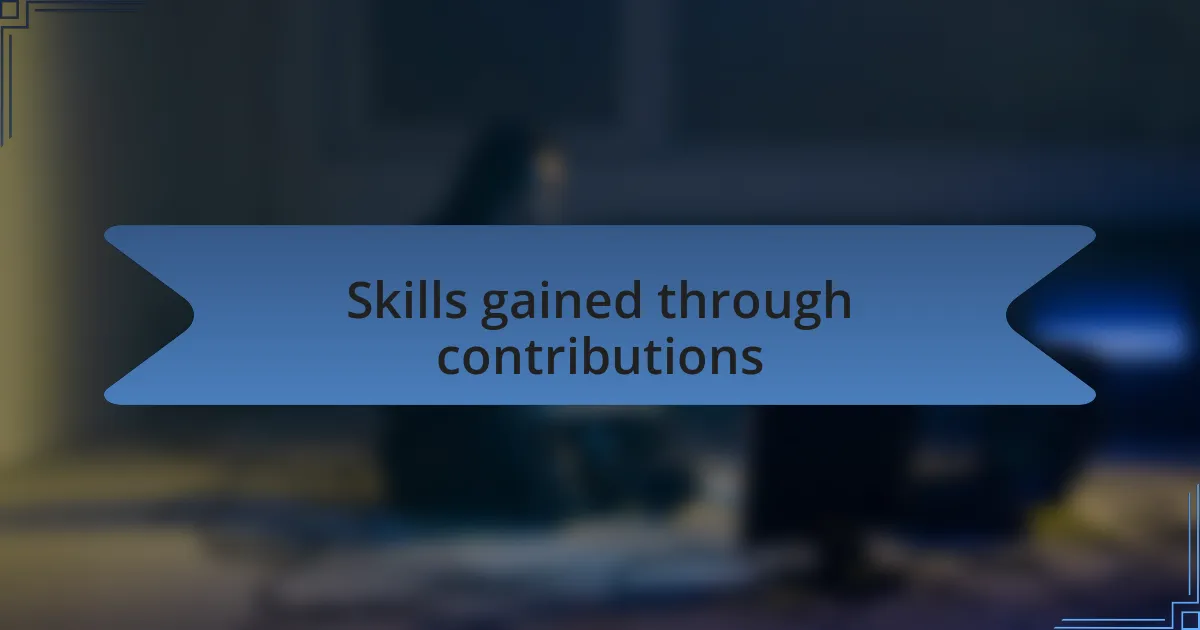
Skills gained through contributions
Contributing to open-source projects has significantly bolstered my technical skills. For instance, I learned Git—an essential version control system—through hands-on experience. At first, I struggled with commands and workflows, but after merging pull requests and resolving merge conflicts, I became much more confident in navigating repositories. Have you ever felt that exhilarating rush when you’ve successfully resolved a complicated issue? It’s truly rewarding.
Alongside the technical growth, I’ve also developed a keen sense of collaboration and communication. Working with diverse teams meant adapting my communication style to different contributors and understanding their viewpoints. I vividly remember a time when a simple comment on a proposed feature sparked a deep discussion that resulted in a much more robust implementation. Isn’t it fascinating how a conversation can evolve into something that significantly impacts a project’s direction?
Perhaps one of the most unexpected skills I picked up was project management. As I progressed, I found myself taking the lead on certain features, which included not only coding but also setting timelines and coordinating efforts. The experience taught me how crucial it is to break down tasks into manageable chunks. Have you ever juggled multiple roles in a project? It can be overwhelming, but it’s also a fantastic way to gain a holistic understanding of the development process.
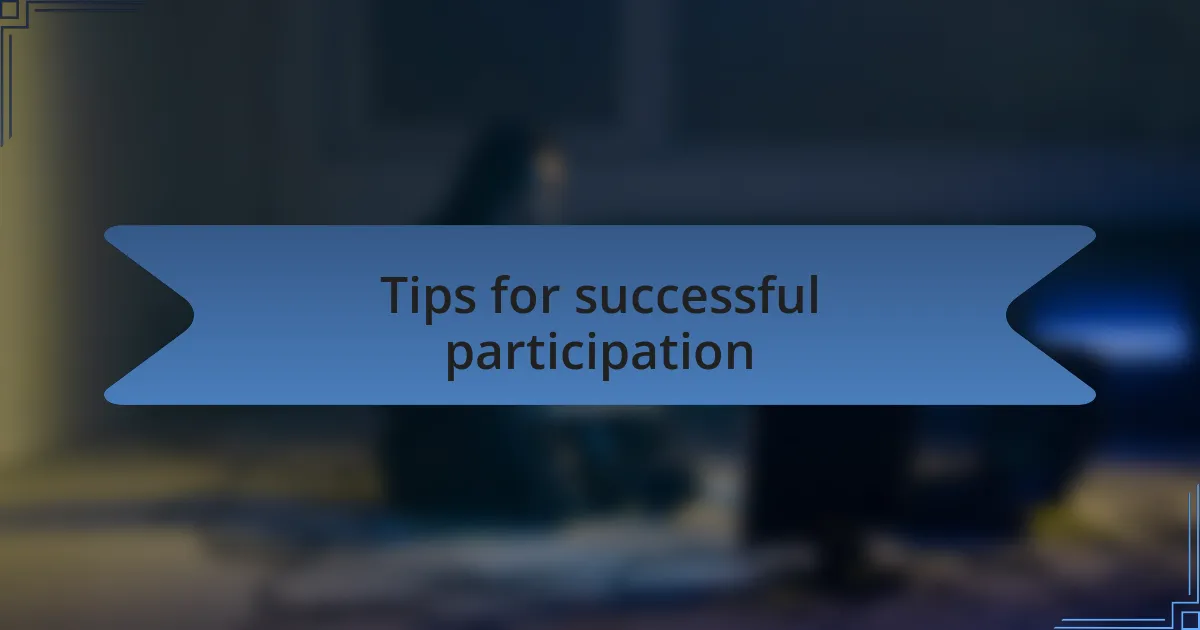
Tips for successful participation
When I first jumped into open-source contributions, I wished someone had told me the importance of reading the project documentation thoroughly before diving in. I remember a project where I spent hours crafting code only to realize later that I had missed a crucial guideline. That moment was tough, but it taught me that investing time to understand the project’s style and rules pays off tremendously. Have you ever felt the frustration of going down the wrong path because of a simple oversight?
Networking within the community can’t be overstated. I found that commenting on issues and participating in discussions helped me not only build rapport with other contributors but also gain insights I wouldn’t have encountered otherwise. For example, during a particularly challenging issue, I reached out to a seasoned developer who provided me with guidance that transformed my approach. It’s amazing how a little connection can lead to big breakthroughs, wouldn’t you agree?
Lastly, embrace feedback with an open heart. In my early contributions, I found it challenging to hear critiques on my code. However, I soon learned that constructive criticism is invaluable. It often sparked conversations that enhanced my understanding of best practices and effective coding approaches. I recall a time when a mentor’s suggestion propelled my work from average to exceptional. Have you ever considered how embracing feedback can not only grow your skills but also build stronger relationships in the community?